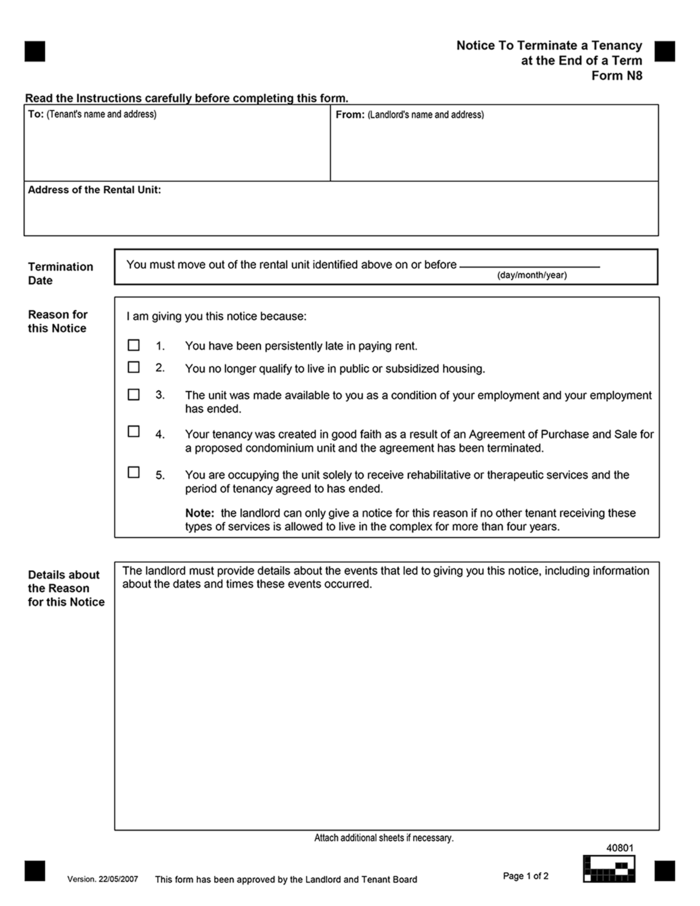A landlord can end a tenancy by giving the tenant a written eviction notice followed by filing for eviction in court. Ending a tenancy can be a complex process for landlords, but it is a necessary step when dealing with problematic tenants or when the landlord wants to regain possession of the property for various reasons.
This article will provide a clear understanding of how landlords can legally terminate a tenancy and the steps involved in the process. By following these guidelines, landlords can navigate the eviction process with confidence, ensuring a smooth transition and protecting their rights as property owners.
So, let’s dive in and explore how landlords can effectively terminate a tenancy.

Credit: www.reddit.com
Notice Requirements
When a landlord decides to end a tenancy, there are specific notice requirements that must be followed. These requirements serve as a necessary step in the process and are designed to protect both the landlord and the tenant. In this section, we will explore two important aspects of notice requirements: determining the appropriate notice period and methods of serving notice.
Determining The Appropriate Notice Period
Before serving notice to end a tenancy, landlords must determine the appropriate notice period based on the specific circumstances and local laws. The notice period can vary depending on factors such as the type of tenancy, the length of the tenancy, and the reason for ending the tenancy. Here are some common notice period examples:
| Tenancy Type | Notice Period |
|---|---|
| Month-to-month tenancy | 30 days |
| Fixed-term tenancy (less than a year) | 30 days |
| Fixed-term tenancy (one year or more) | 60 days |
| Tenancy at will | Immediate notice of termination |
Methods Of Serving Notice
After determining the appropriate notice period, landlords need to serve the notice to the tenant. There are different methods that can be used to serve notice, and it’s important to choose the appropriate method according to local laws and regulations. Here are some common methods:
- Hand delivery: Deliver the notice directly to the tenant in person, ensuring they receive a copy.
- Certified mail: Send the notice via certified mail with a return receipt requested to ensure proof of delivery.
- Notices posted: In some cases, posting the notice on the tenant’s door or in a visible location can be a valid method of serving notice.
Remember, it’s crucial to document the date and method of serving notice for future reference.
By understanding the notice requirements, landlords can navigate the process of ending a tenancy smoothly and legally. Determining the appropriate notice period and using the correct methods to serve notice are essential steps to ensure a fair and transparent process for both parties involved.

Credit: www.ezlandlordforms.com
Grounds For Termination
As a landlord, there may come a time when you need to end a tenancy. However, it is important to understand that you cannot simply evict a tenant without valid reasons. There are specific grounds for termination that you must adhere to, which are outlined below.
Nonpayment Of Rent
One of the most common reasons for terminating a tenancy is nonpayment of rent. When a tenant fails to pay rent on time, it can create financial strain for the landlord. In such cases, the landlord has the right to end the tenancy. However, it is important to follow the proper legal procedures before taking any action. This involves providing the tenant with a written notice clearly stating the amount of unpaid rent and giving them a specific timeframe to pay.
Violation Of Lease Terms
Another valid ground for terminating a tenancy is if the tenant violates the terms of the lease agreement. This can include subletting the property without permission, unauthorized pets, excessive damage to the property, or engaging in illegal activities on the premises. When such violations occur, the landlord has the right to terminate the tenancy. However, it is essential to provide the tenant with a written notice specifying the violation and giving them a reasonable amount of time to rectify the issue. If the violation continues, the landlord can proceed with eviction.
Illegal Activities
Engaging in illegal activities on the rental property is a serious breach of the lease agreement and can lead to immediate termination. If the tenant is involved in drug-related activities, violent acts, or any other criminal actions, the landlord has the right to evict them. In such cases, it is crucial to involve the local law enforcement authorities and provide them with any necessary evidence to support the termination.
Overall, as a landlord, it is important to be aware of the grounds for termination and follow the legal procedures when ending a tenancy. Whether it’s due to nonpayment of rent, violation of lease terms, or illegal activities, providing written notices and allowing appropriate time for resolution is vital to ensure a smooth and lawful termination process.
Legal Process
Ending a tenancy is a legal process that must be followed by landlords. While there may be various reasons for a landlord to terminate a tenancy, understanding the legal process can help both landlords and tenants navigate through the situation smoothly. The legal process typically involves filing an eviction lawsuit, preparing for the court hearing, and enforcing the eviction order.
Filing An Eviction Lawsuit
When a landlord wants to end a tenancy, the first step is usually filing an eviction lawsuit. This legal document officially notifies the tenant that they are being sued for eviction. To file an eviction lawsuit, the landlord must:
- Fill out the necessary legal forms, including a summons and complaint, which outline the reason for eviction and the desired outcome.
- Ensure that the forms are completed accurately and comply with the local laws and regulations.
- Legally serve the tenant with the eviction lawsuit by delivering the documents in person or through certified mail.
It’s crucial for landlords to adhere to the proper procedures and timelines when filing an eviction lawsuit to avoid potential complications.
Preparing For The Court Hearing
After filing an eviction lawsuit, landlords must prepare for the court hearing. This stage allows both parties to present their case and arguments before a judge. To ensure a smooth and successful court hearing, landlords can:
- Gather any relevant evidence, such as lease agreements, rental payment records, and communication with the tenant regarding the tenancy termination.
- Prepare a comprehensive and clear written summary of the reasons for eviction, outlining the supporting facts and legal basis.
- Review local laws and regulations to ensure compliance and be well-prepared to address any potential objections or defenses raised by the tenant.
Being well-prepared for the court hearing can significantly increase the landlord’s chances of obtaining a favorable judgment.
Enforcing The Eviction Order
Once the court has ruled in favor of the landlord and issued an eviction order, the landlord must take steps to enforce the order. This may include:
- Providing the tenant with a written notice to vacate, specifying a deadline by which they must leave the premises.
- Keeping records of all communication and actions taken during the eviction process.
- Seeking assistance from law enforcement or a professional eviction service if the tenant fails to comply with the eviction order.
- Ensuring the removal of the tenant’s belongings from the property, either through voluntary cooperation or, if necessary, by following local laws to dispose of or store the belongings.
It’s important for landlords to follow all the necessary steps outlined in the eviction order and comply with local laws regarding the removal of the tenant from the property.

Credit: rentalawareness.com
Frequently Asked Questions For How Landlord Can End A Tenancy?
Can A Landlord Terminate A Lease In Texas?
Yes, a landlord in Texas can terminate a lease, but they must comply with specific legal requirements. These requirements include providing notice to the tenant and following the appropriate eviction process.
How Much Notice Does A Landlord Have To Give A Tenant To Move Out In Texas?
A landlord in Texas must give a tenant a written notice to move out at least 30 days before the termination date specified in the notice.
What Can Landlords Not Do In Texas?
In Texas, landlords cannot discriminate based on certain protected characteristics. They cannot retaliate against tenants or withhold vital services. Landlords must also maintain safe and habitable conditions in their rental properties. Additionally, they must give proper notice before entering a tenant’s home and cannot make unauthorized deductions from security deposits.
How Do I Stop A Tenancy?
To stop a tenancy, follow these steps: 1. Check your lease agreement for termination clauses. 2. Give proper notice to your landlord, typically 30 days in advance. 3. Complete a move-out inspection to document the condition of the property. 4.
Settle any outstanding financial obligations. 5. Return the keys and leave the property in good condition.
Conclusion
In light of the information presented, landlords can effectively terminate tenancies by following the legal procedures and guidelines outlined in this blog post. By ensuring adherence to local laws, providing proper notice, and offering clear communication, landlords can navigate the process smoothly.
Remember, terminating a tenancy is a serious matter that requires careful consideration and compliance with legal requirements. By doing so, both landlords and tenants can achieve a fair and respectful resolution.

